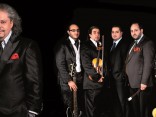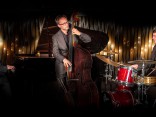Some say the dividing line between classical music and non-classical music is thicker in Germany than it is elsewhere, but our many years of experience with the Play Bach Legend, Jacques Loussier, was different. All throughout his fifty-year career, Loussier had his greatest successes right here in Germany. When you look at where he played, the audience reactions, and what the critics have said, the message is clear: His status as world star in this near-classical genre was well deserved, often called ‘crossover’ for lack of a better term. Franz Liszt had a fitting term for it: virtuoso poet. He elevated improvising virtuosos to the rank of composer, who, in contrast to classical musicians, must not only be excellent instrumentalists but also prove themselves by means of their arrangements and their artistry in improvisation. ROBY LAKATOS, the TEREM QUARTET and DAVID GAZAROV are certainly virtuoso poets of this type.
ROBY LAKATOS is a descendent of Janos Bihari, the violin virtuoso and the star of the Congress of Vienna who people speculate may have composed Rákóczi March or some of the themes from Liszt’s Hungarian Rhapsodies. There was a series of spectacular ‘Gypsy’ violin virtuosos, kings of the ‘gypsy violin’—Jascha Heifetz considered Grigoras Dinicu to be the greatest violinist anywhere, while Toscanini and Casals idolized Imre Magyari – and Debussy, Béla Radics. Now, Roby Lakatos, who has shared the stage with musicians such as Maxim Vengerov and Vadmi Repin a sold-out Carnegie Hall or the Sydney Opera House, definitely belongs on this list—a musician whom the Daily Telegraph has called “World’s fastest fiddler’s fingers.”
Orchestra projects include: Verbunkos compositions that made use of Liszt’s themes from his Hungarian Rhapsodies, and a ‘Gypsy’ program that is much more than simply Monti’s Czardas.
The TEREM QUARTET was well known even before their performance with Mariss Jansons and the Bavarian Radio Symphony Orchestra in Munich. Pope John Paul had them perform at the Vatican for an audience of 120,000 (where Mother Teresa took care of them backstage), they played with the Marinsky Orchestra and the Moscow Soloists in the Olympic opening ceremonies in Vancouver, Barcelona, and Sochi, and they were favorites of Karl Lagerfeld, Peter Gabriel, and the British royal family. The totals from the quartet’s 30-year history are: They’ve played over 3,000 concerts in 70 countries and recorded 30 CD’s with over 500 arrangements for their unusual instrumentation of domras, bayan, and contrabass.
Orchestra projects include: “White Nights” arrangements of well-known works by Russian composers—a Tchaikovsky theme, crossed with a Yakut reindeer song; movie music from Soviet blockbusters such as “Beware Of The Car!”. Another program is “MyBach”
DAVID GAZAROV filled in for Loussier when he took ill, cashing in at the Berlin Philharmonic, the Bremer Glocke, the large broadcasting studio of NDR (Northern German Broadcasting), and at the Rheingau Music Festival, among other great successes. To think of him as simply “Loussier’s worthy successor,” as the press wrote, does not do him justice. This classical pianist who studied with a student of Shostakovich in Baku has a phenomenal musical memory that allowed him to reproduce jazz pieces he had heard on the forbidden program Voice of America, and even to write down a full big band score. The SZ has compared him to Gulda (“Friedrich Gulda must have tipped his hat shamefacedly …”), and Jazzthetik his spoken of him “as though Art Tatum and Vladimir Horowitz were going on vacation together in the Orient.”
Orchestra projects: Gerschwin’s Rhapsody in Blue, unique arranged with a rhythm group, string orchestra, and only six winds, and improvisational bits. More works by jazz pioneers Irving Berlin, Jerome Kern, and Cole Porter, among others.






